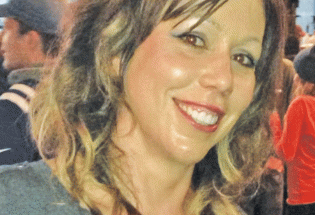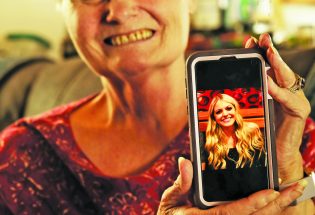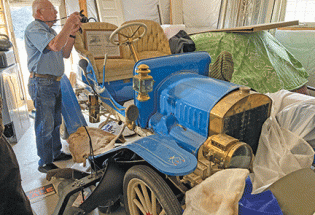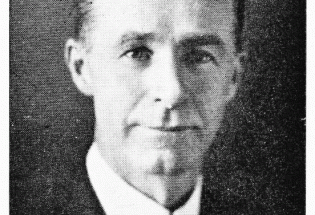Ambrosia Harvest starts sprouting mushrooms in Berthoud
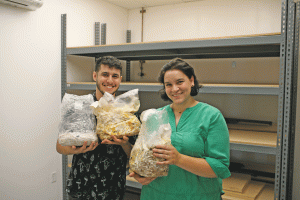
Photo by Will Cornelius
Isaiah Chavez and Sara Del Cuore with their fungal products at the Ambrosia Harvest warehouse in Berthoud.
By Will Cornelius
The Surveyor
Isaiah Chavez knew something was wrong. He had lost the ability to control the movement of his arms or legs. Doctors were unsure what had happened to Chavez but thought it was possibly a rare brain disorder. It was a tragic turn of events for the aspiring environmental engineer.
“It pretty much paralyzed me from the waist down. Then I lost the ability to use my left arm for the most part and my back was constantly convulsing,” Chavez explained. It was a devastating blow for him as he had been completely healthy before and wrestled competitively for 12 years previously. “Randomly out of nowhere I just had a seizure one day. I woke up, couldn’t feel my legs and I was convulsing everywhere.”
A series of doctors were unable to diagnose him. “Six months of testing later, they just couldn’t find anything wrong with me,” Chavez explained. The doctors told him there was not much else they could do for him except try to treat his symptoms. The outlook was grim, but Chavez is a bit different than most people.
“I have autism which kind of makes a big difference in my life. I always like to preface that—explains a lot of things in terms of why I’m so obsessed with mushrooms,” he said. As an environmental engineer, Chavez had some knowledge of fungi, but he was about to learn a lot more. With a curious mind, ample free time and unrivaled persistence, Chavez began experimenting with mushrooms in hopes of discovering a cure for his ailment. “I started working with different fungal cultures, and looking to see if this one had an effect on me or if this one did,” he recalled. “I went kind of crazy and started building a laboratory.” Crawling and dragging himself around his house, Chavez was determined to learn if strains of fungi could help him.
“Eventually I ended up with this strain, just kind of via cloning, that seemed to be pretty effective on a microdose level. So, I basically took a bunch of it over a three-day period and combined it with Gabapentin (a medication to treat seizures) and some acidic acid. Mixed that together and took that in increasing dosages. And by the third day, I was better,” Chavez stated. He said it took time for him to fully recover, but he still remembers after the third day being able to use his legs again and stand up.
Wearing a colorful short-sleeve shirt dotted with mushrooms and a beaming smile, Chavez recounts the ordeal at a coffee shop in Longmont. He hypothesized that there was a problem with the neural pathways in his brain. Imagine your brain as a big map with lots of roads. Neural pathways are like roads in your brain. They are special connections that help different parts of your brain talk to each other. When you learn something new, like riding a bike, your brain creates a pathway to remember how to do it. The more you practice, the stronger the pathway becomes, making it easier for your brain to find that information again in the future. Just like you use roads to get from one place to another, your brain uses these pathways to send messages and help you move, think, learn and remember things.
To use the same analogy, Chavez thinks that his neural pathways were littered with potholes, so his brain was unable to do the things it did before. “I would repeat the same actions over and over, I had no control over my movements,” he said. Fungi and their possible effects on neural pathways are still an emerging field of research, but one that has people other than Chavez interested in its potential. Recent studies showing the benefits of fungi for people with post-traumatic stress disorders have shown promising results.
Last November, voters in Colorado narrowly passed Proposition 122 by a 54% to 46% margin to approve the Natural Medicine Health Act. The Act decriminalized psilocybin and psilocin, also known as magic mushrooms. They will not be available for purchase over the counter though. The state is required to set up a regulatory framework that would allow people to receive treatment through state-regulated facilities, or healing centers as proponents call them, with trained staff assisting.
Chavez is set to be a part of this framework in the future as someone who studies fungi, or as it is known in the industry, a mycologist. He is now the lead mycologist at Ambrosia Harvest, a fungi-based business that offers a plethora of services related to mushrooms, fungi and mycelium.
Mushrooms, fungi, and mycelium are interconnected components of the fungal world, each serving distinct roles. Fungi represent a vast kingdom of organisms that are neither plants nor animals. Mycelium, the root-like structure, forms the vegetative body of a fungus, consisting of a network of tiny threads called hyphae. It acts as the primary nutrient-absorbing structure, crucial for decomposition and nutrient cycling. Mushrooms, on the other hand, are the fruiting bodies of certain fungi, arising from mycelium when conditions are favorable. Mushrooms are the reproductive structures, dispersing spores to propagate and spread.
Ambrosia Harvest was founded by Sara Del Cuore and her cousin Anthony Gengaro. “We are just so completely enamored with this idea of what we could do,” said Del Cuore, the CEO of the company, about the untapped potential of fungi. “Through happenstance and network, we met Isaiah (Chavez) and just started talking with him. We were really impressed with not only his story, but his knowledge base and his passion for what this can do.”
With experience in urban agriculture and the mortgage business, Del Cuore was able to draw on her and Gengaro’s networks to begin formulating a business plan. “We came across growing mushrooms in a container. We were kind of researching what that looked like. Because the yields were said to be amazing,” she explained.
Besides the potential health benefits and use as a food source, there are many other applications for fungi. “It can be turned into textiles, for manufacturing, it can be used for building materials, installation, things like that. It can be used for packaging material, it can be used for bioremediation.”
But before they could save the world, they needed a warehouse for Chavez to set up his self-described “mad scientist” fungi laboratory. Berthoud offered the perfect spot when a warehouse off Second Street came on the rental market. “No other warehouse worked out because this one was absolutely perfect,” Del Cuore said about finding one in the garden spot with heating and air conditioning. For the past couple of months, Ambrosia Harvest has begun to sprout up a lab filled with Petri dishes containing cultures of new spores, climate-controlled grow tents for mushrooms, sterilization equipment and lots of bags filled with fungi.
Ambrosia Harvest wants to position itself as an expert in the mushroom world. Whether that is teaching classes, consulting with mushroom farmers, working with manufacturers who want to harness the health benefits of fungi or just setting up people to grow mushrooms in their homes. “The mushroom aspect of it is so centered in that cultural psyche right now. And there are so many benefits of it,” Del Cuore said.
Chavez said he also works with people who have cancer or are paralyzed to see if fungi can help them. “We come up with all kinds of different solutions that incorporate mushrooms and adaptogens,” he explained. “I tailor it exactly to their situation. There have been incredible results—like these people really notice differences.”
If there is one wish for Chavez, it is for people to learn more about the fungi world. “We only know about one mushroom in America,” Chavez said with an air of disdain “the button mushroom.” Almost all mushrooms in a supermarket are the same he explains, baby bellas, portobellos, white or brown, are all the same species. “It’s actually a pretty terrible mushroom compared to a lot of other mushrooms like oysters that taste so much better or like a good lion’s mane mushroom. There are so many different options that are out there,” Chavez explains.
And if the idea of mushrooms as medicine seems far-fetched, they are already being used as a medicine most people take for granted now. “It’s why we have antibiotics. It’s because of fungus,” Chavez said referring to penicillin. “It’s something we found in the wild. But it’s the thing that has saved the most lives in the world by far is antibiotics.”
For more information about all things mushrooms check out www.ambrosiaharvest.com.
- May, 05 2022
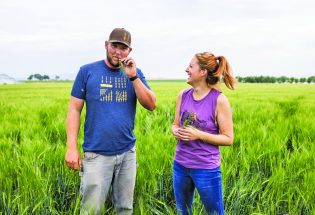
Root Shoot Malting continues to grow ...
Root Shoot Malting is adding another malting drum this winter to be able to malt...
- January, 17 2024

Colorado business confidence is impro...
By Will Cornelius The Surveyor Business confidence is improving across Colorado but is still below...
- February, 23 2023

Amy Kuber creates baby wearing jacket...
By Shelley Widhalm The Surveyor Berthoud business owner Amy Kuber wanted to go on a...
- July, 06 2018
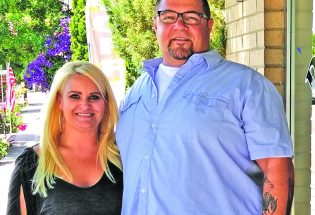
Shelly Otanez of Berthoud opens old-t...
By Shelley Widhalm The Surveyor Shelly Otanez of Berthoud carried her love of barbering into...
- February, 05 2021
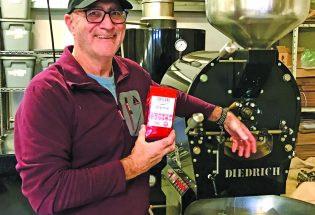
Linger Coffee to begin offering flavo...
Berthoud roaster Brent Bromstrup wants people to linger over his coffee, so he came up...
- June, 25 2020
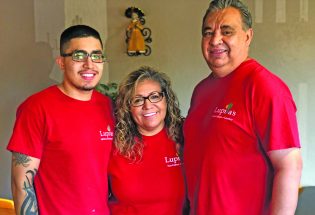
Lupita's Mexican Restaurant ̵...
Photo by Dan KarpielLupitas Mexican Restaurant owners Martina (center) and Ernesto Becerra and their son-in-law...
- Asher Architects builds projects from...
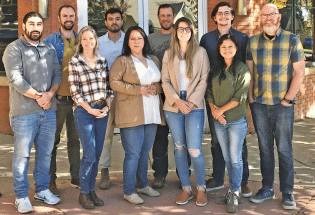
- More than a market, a family legacy
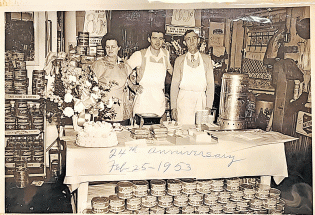
- Colorado business confidence is impro...

- Unified basketball comes to Turner Mi...

- Thompson School District reviews bond...

- Roy Tripi to become principal of BHS ...
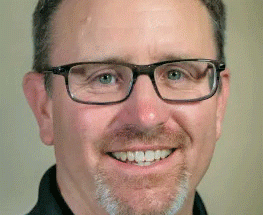
- Community Calendar & Legal Notice...
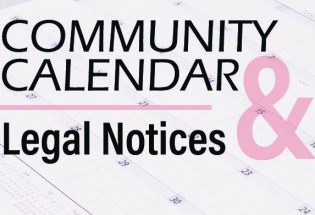
- Community Calendar & Legal Notice...

- Community Calendar & Legal Notice...


Unified basketball comes to Turner Middle School
Community News
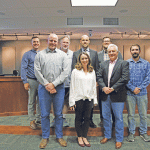
Mike Grace says goodbye as Brett Wing joins town board
Community News
POLICEBLOTTER
Community News
Northern Water sets C-BT quota at 70% for 2024
Community News

Emotions run high during Revere Property hearing
Community News
Snowpack at 119% above normal
Community News

Karspeck to serve third term as Berthoud mayor
Community News
COMMUNITY CALENDAR:
Community Calendar – add an event
Homestead Fine Art Gallery First Fridays OPEN HOUSE
03 May 4:00 PM - 7:00 PM
Homestead Fine Art Gallery First Fridays OPEN HOUSE
07 Jun 4:00 PM - 7:00 PM
Homestead Fine Art Gallery First Fridays OPEN HOUSE
05 Jul 4:00 PM - 7:00 PM
Homestead Fine Art Gallery First Fridays OPEN HOUSE
02 Aug 4:00 PM - 7:00 PM
Homestead Fine Art Gallery First Fridays OPEN HOUSE
06 Sep 4:00 PM - 7:00 PM
Homestead Fine Art Gallery First Fridays OPEN HOUSE
04 Oct 4:00 PM - 7:00 PM




